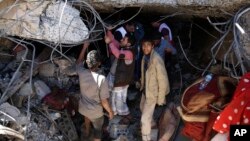The Saudi ambassador to the Human Rights Council said Thursday that his country rejects “accusations” from two top human rights groups, who have called for Saudi Arabia's suspension from the U.N.-backed body over its military campaign in Yemen.
Ambassador Faisal Trad said Saudi Arabia was "keen" to abide by international law, review allegations about its military operations and assist aid workers and advocacy groups in Yemen, where a Saudi-led, U.S.-backed coalition has been fighting Shiite and other rebels since March 2015.
Human Rights Watch and Amnesty International on Wednesday called for Saudi Arabia's suspension from the Geneva-based body until Saudi forces halt indiscriminate airstrikes in Yemen that have killed over 900 civilians.
In an email to The Associated Press, Trad countered that the two groups were "rejecting the facts" and "the truth about what is happening in Yemen," pointing to "violations" committed by the rebels.
"With regard to Yemen, Saudi Arabia and the coalition [are] keen to abide by international humanitarian law and apply the highest international rules of engagement which corresponds with international regulations,'' Trad wrote.
U.S. complicity?
The rights groups argued that if Saudi Arabia is found guilty of war crimes, the United States could be complicit because it provides airstrike targeting information for the Saudi-led coalition. The State Department would not comment Wednesday on allegations of possible U.S. complicity in war crimes or whether Saudi Arabia should be suspended from the council.
Under U.N. rules, a two-thirds majority of the General Assembly in New York would be needed to suspend the rights of any Human Rights Council member – a virtually impossible outcome in the case of Saudi Arabia, considering its political and economic clout.
Critics of the Human Rights Council note that its 47 members include countries such as Venezuela, Burundi and Russia, which have also faced criticism over their rights records.








